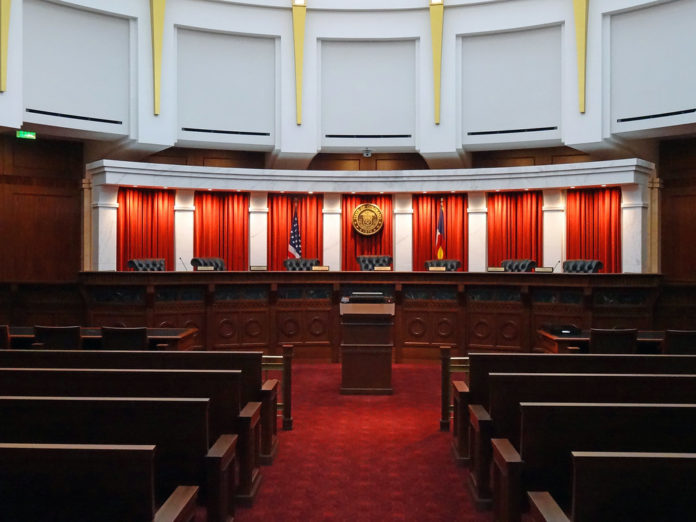
The Colorado Supreme Court on Feb. 8 will hear oral arguments in two criminal cases that raise questions about the use of fire as a deadly weapon and suppression of statements made to the police.
People v. Brown
The state argues a trial court should not have suppressed statements by defendant Alexander Brown. Brown and a woman were sitting in a car in a Denver parking lot when they were approached by police. According to police, there was smoke and a strong marijuana smell coming from the car.
A police officer asked to search the car for drugs, which Brown initially refused. The officer said he was going to call for a drug-sniffing dog, but the dog was not available. Police asked again to search the car, and Brown eventually agreed.
While Brown and the officers talked, the woman in the car said she wanted to go back to her apartment. One of the officers patted her down as she left the car and found a gun, at which point Brown said, “It’s mine, it’s mine.”
Brown was handcuffed, put into a police car and advised of his Miranda rights, which he waived, according to the state. An officer asked again whether the gun was his, and Brown said it was and that he had given it to the woman because he was scared. Brown was arrested and charged with possession of a weapon by a previous offender.
Brown moved to suppress evidence obtained during his police encounter. The court ruled that Brown didn’t have standing to challenge the search of the woman, preventing him from challenging the discovery of the gun. The court later found that the police didn’t have reasonable suspicion to seize Brown, despite the smoke and marijuana odor, based on the subjective intent of the officer, who stated he was “not concerned with the marijuana,” according to court documents. The court suppressed statements that Brown made after the officer said he would be calling for a drug-sniffing dog, at which point the encounter escalated to an investigatory stop.
On appeal, the state argues the police had probable cause to arrest Brown because public consumption of marijuana is illegal. “The officer’s subjective intent on whether he planned to arrest Brown for the marijuana violation is irrelevant,” the state says in its opening brief. Because a crime was being committed, the police were “objectively reasonable” in detaining Brown, who consented to a search and “spontaneously declared ownership” of the gun. The state is asking the high court to reverse the order suppressing Brown’s statements.
Brown also contests the trial court’s conclusions, arguing the lower court erred when it found Brown’s exchange with the police officers was initially consensual and only escalated to an investigatory stop when the officer announced he would call for a K-9 unit. Brown contends the police lacked reasonable suspicion to stop him, so the seizure was unlawful. He also argues he was not consuming marijuana in an “open and public” place because his car was parked away from members of the public in a dark, privately owned parking lot. He asks the court to find that he was unconstitutionally seized without probable cause or reasonable suspicion from the moment the police pulled up behind him in the lot.
Magana v. People
In this case, Christopher Magana challenges his arson convictions. Magana admitted to setting his ex-girlfriend’s car on fire. The fire spread to the ex-girlfriend’s duplex, where 14 people lived. He was convicted of two counts of first-degree arson, two counts of second-degree arson and 14 counts of fourth-degree arson.
Magana asks the court to reject the state’s request to find the first-degree arson convictions are crimes of violence because he used fire as a deadly weapon. The state legislature hasn’t said fire is a deadly weapon that can be used to make first-degree arson a crime of violence, Magana contends, and treating it as such would violate equal protection.
“It would give prosecutors the power to charge every first-degree arson as a [crime of violence] because first-degree arson always involves the use of fire as a deadly [weapon],” Magana states in his opening brief. This would allow prosecutors to arbitrarily subject people to additional penalties required under Colorado’s mandatory sentencing laws for crimes of violence, he argues.
Magana also argues he has too many arson convictions. He set one car on fire but received 18 arson convictions. Magana argues the legislature intended the unit of prosecution for each crime to be an act of starting a fire or causing an explosion. He is only accused of starting a single fire, so he should only have one conviction for each offense, Magana argues.
The state argues the Court of Appeals correctly held Magana’s multiple convictions don’t violate double jeopardy because the legislature has authorized multiple convictions based on the number of people endangered, the number of buildings burned and the amount of property damaged. Magana endangered 14 people and caused two homes and two cars to be burned, so the number of convictions is appropriate, the state says in its answer brief.
The state also says that fire is not always a deadly weapon in first-degree arson. Only when the prosecution establishes that fire was used in a way that could cause death or serious bodily injury is it a deadly weapon that can make first-degree arson a crime of violence, the state argues, and this interpretation doesn’t implicate equal protection. The state also urges the Supreme Court to “revisit Colorado’s unique equal protection doctrine,” which it says “deviate[s] from the federal standard with little explanation or reason.”

